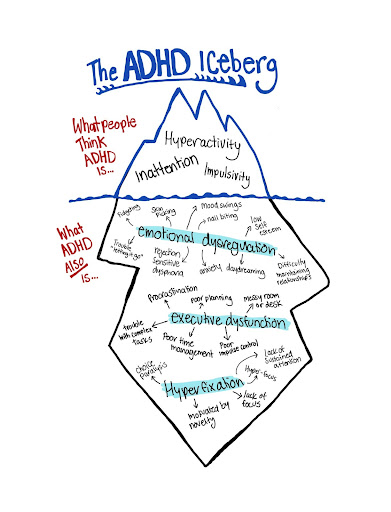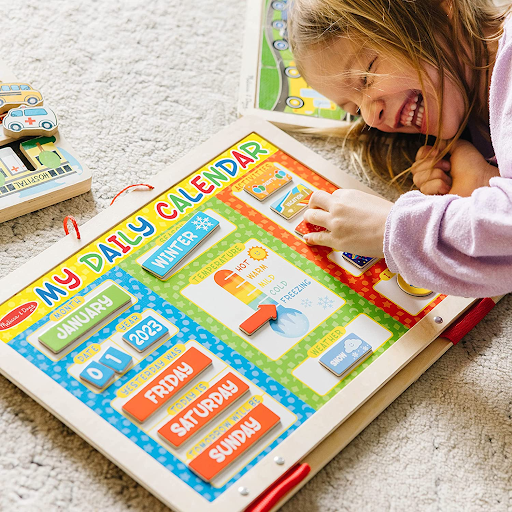Écrit par: Lindsay Peltsch Infirmière autorisée, B.Sc.Inf.
Contributions de : Sadie Katz

Trouble déficitaire de l’attention avec hyperactivité (TDAH) est l’un des troubles neurodéveloppementaux les plus courants chez les enfants. Une prise de conscience accrue a conduit à ce que de nombreux enfants soient diagnostiqués, ce qui n'aurait peut-être pas été le cas au cours des générations précédentes. Bien que les symptômes classiques d’hyperactivité, d’impulsivité et d’inattention soient largement reconnus, il reste de nombreux symptômes « cachés » chez les enfants qui peuvent entraîner un retard, voire une absence totale de diagnostic. Dans ce blog, nous explorerons trois signes invisibles du TDAH chez les enfants : Dysrégulation émotionnelle, dysfonctionnement exécutif et hyperfixation basée sur les intérêts. Vous verrez qu'ils ne sont pas aussi cachés que vous ne le pensez et, espérons-le, ils vous donneront un aperçu du cerveau de votre enfant et des aspects souvent mal compris du TDAH.
1. Monter sur les montagnes russes : dérégulation émotionnelle
De nombreuses personnes atteintes de TDAH luttent contre autorégulation – leur système nerveux réagit de manière excessive à différents stimuli, ce qui peut provoquer un changement d’humeur… et rapide. Alors que le tableau typique du TDAH inclut une hyperactivité visible, en réalité, seulement 25% des enfants atteints de TDAH sont visiblement hyperactifs. Et le reste alors ? Pour la grande majorité, la majeure partie de leur hyperactivité se produit en interne. Votre enfant peut sembler très blessé, trop nerveux, être anxieux et/ou avoir des difficultés à dormir. Vous remarquerez peut-être qu’ils s’ennuient facilement, qu’ils rêvent toujours, qu’ils mâchent leurs crayons, qu’ils grattent les croûtes ou qu’ils se rongent les ongles. Garder cette énergie hyperactive en bouteille à l’intérieur peut être une torture pour une personne. Au fil du temps, l’estime de soi d’un enfant peut être affectée négativement.
Il est important de se rappeler que les sautes d'humeur soudaines de votre enfant ont un déclencheur précis (même si vous devez fouiller pour le trouver) et qu'elles ont tendance à correspondre à une réponse neurotypique, sauf qu'elles sont BEAUCOUP plus intenses. Les humeurs passent aussi généralement. Un exemple de ceci est dysphorie sensible au rejet. C'est à ce moment-là que les enfants reçoivent des commentaires négatifs, réels ou perçus, des rejets, des taquineries ou qu'ils ont laissé tomber quelqu'un (même eux-mêmes !), et que leur système nerveux hyperactif crée ce qu'une personne neurotypique considérerait comme une réponse disproportionnée et extrême. Vous pouvez avoir l’impression que votre enfant est hypersensible ou trop réactif, mais il ressent en réalité ces émotions intenses à un niveau différent au quotidien. Lorsqu’un enfant extériorise ces grands sentiments, vous pouvez le voir se déchaîner soudainement avec rage. Cependant, lorsqu’un enfant intériorise ces émotions négatives, cela peut être moins évident pour les parents. Ils peuvent développer une estime de soi négative ou s’engager dans un discours intérieur négatif. Ils peuvent sembler anxieux, plaire aux autres ou avoir du mal à nouer ou à entretenir des amitiés. Ils peuvent même trop réussir, trop s'organiser, trop se préparer et se surmener, car ils craignent de laisser tomber quelqu'un.

KixConseils :
Évitez de mettre trop de pression sur votre enfant pour qu'il réussisse à l'école, au sport, etc. Faites-lui savoir qu'il fait de son mieux et c'est tout ce qui compte.
Encouragez votre enfant à réfléchir et à communiquer ses émotions et à réévaluer la pertinence de ses réactions au lieu de le punir pour « s'être déchaîné ».
2. Dysfonctionnement exécutif : par où commencer ?
Dysfonctionnement exécutif chez les enfants atteints de TDAH fait référence à des difficultés dans les parties du cerveau responsables de la planification, de l'organisation, du lancement des tâches, de la priorisation et du maintien de l'attention. Les enfants atteints de TDAH peuvent avoir du mal à commencer ou à terminer leurs tâches, à gérer efficacement leur temps ou à organiser leurs affaires. Vous remarquerez peut-être qu’ils donnent des réponses impulsivement ou qu’ils sont excessivement bavards. Votre enfant peut avoir un bureau ou une chambre en désordre chronique ou être dépassé lorsque vous lui demandez de commencer une tâche qui dure plus de quelques étapes. Pour aider votre enfant dans ses fonctions exécutives…

Encouragez votre enfant à utiliser un calendrier et à créer des listes de contrôle pour les tâches quotidiennes comme les corvées ! Pratiquez cette habitude en famille en planifiant la semaine à venir sur papier et en l'affichant là où votre enfant la verra. De plus, il a été démontré que l’exercice physique de routine améliore la fonction cognitive et l’attention des personnes atteintes de TDAH. Encouragez l'exercice régulier pour aider à réduire l'impulsivité et l'hyperactivité et à améliorer l'humeur de votre enfant. Essayez d'inscrire votre enfant à des sports récréatifs !
3. Garder les yeux rivés sur le prix…. Tant que c'est intéressant.
Le nom même de ce trouble est un peu abusif : il n’y a pas de déficit d’attention. Au lieu de cela, c’est que leur attention est incohérente. Bien que de nombreux enfants atteints de TDAH aient certainement du mal à prêter attention, vous remarquerez peut-être que si votre enfant est intéressé par le sujet ou la tâche, il devient plus attentif. focalisé au laser dessus. Votre enfant habituellement distrait peut passer des heures hyper concentré sur son nouvel intérêt, souvent à l’exclusion de toute autre chose et des gens, perdant généralement la notion du temps. Tandis que les personnes neurotypiques peuvent être motivées par une échéance (devoir scolaire dans le futur) ou par la priorité d'un élément. Pour les enfants atteints de TDAH, ils sont motivés différemment. La nouveauté, l'intérêt passager, les récompenses, la compétition ou l'urgence (mon projet doit être rendu demain matin et je n'ai pas commencé !) sont les éléments qui ont tendance à les faire avancer.

KixConseils :
Continuez à féliciter les réalisations et à soutenir les nouvelles passions de votre enfant !
Il peut également être utile de fixer de « fausses » dates limites pour les devoirs afin de favoriser ce sentiment d'urgence et de motivation.
N'oubliez pas qu'il est normal que votre enfant explore différentes stratégies pour gérer ses émotions, accomplir des tâches et découvrir ce qui l'allume et le motive. Il peut être difficile de trouver ce qui leur convient le mieux, mais nous sommes là pour vous aider. Notre équipe KixCare offre un accès 24h/24 et 7j/7 à des psychoéducateurs et psychométriciens pédiatriques pour vous aider, vous et votre enfant, à gérer et à prendre le contrôle de leurs super pouvoirs liés au TDAH.

Si vous souhaitez parler à un spécialiste, notre Abonnement Kix360 vous permet d'envoyer des SMS à une infirmière pédiatrique expérimentée 24h/24 et 7j/7 sur demande.
Vous voulez plus de contenu intéressant comme celui-ci ?




![Vérifier l'approbation pour [YOUR-WEBSITE-URL].com](https://static.legitscript.com/seals/11167439.png)
